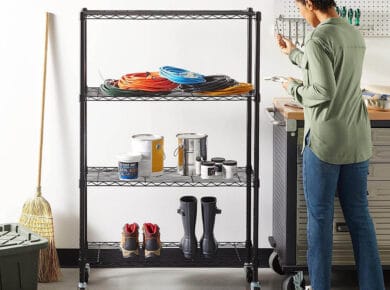How to Organize a Small Kitchen: Practical Tips and Ideas
Having a small kitchen can be a challenge, but with the right organization strategies, you can make the most of your space and create a functional and efficient cooking area.
In this comprehensive guide, we will provide you with practical tips and ideas on how to organize your small kitchen effectively.
How to Organize a Small Kitchen
1. Understand Your Kitchen and Make a Plan
The first step to organizing your small kitchen is to understand how you use it and what system will work best for you.
Ask yourself questions like:
- How often do you cook?
- What types of meals do you prepare?
- How many people use the kitchen?
- How many kitchen items do you need?
- Which gadgets and tools do you use frequently?
By answering these questions, you can tailor your organization strategy to suit your specific needs and preferences.
Remember, everyone’s kitchen is different, so it’s important to create a space that works for you.
2. Divide Your Kitchen into Zones
Dividing your kitchen into zones is an effective way to maximize your space and keep everything organized.
Think about the different tasks you perform in your kitchen, such as food prep, cooking, eating, and washing up, and assign a specific zone for each task.
For example, designate an area for food prep where you keep all your cutting boards, knives, and other essential tools.
Keep your mugs and coffee maker together in another zone for your morning routine.
By organizing your kitchen in this way, you’ll always know where to find what you need and maintain a tidy space.
3. Declutter Your Kitchen
Before you start organizing, it’s essential to declutter your kitchen.
Start by going through your cabinets and drawers and removing items you no longer use or need. Sort these items into four piles: keep, donate, store, and trash.
Be ruthless when decluttering and only keep items that are essential or bring you joy.
Consider donating or giving away items that are in good condition but no longer serve a purpose in your kitchen.
This process will help create more space and make it easier to organize your kitchen effectively.
4. Maximize Cabinet Space
In a small kitchen, cabinet space is precious. Make the most of every inch by using space risers.
These handy tools allow you to stack items vertically, making it easier to access everything in your cabinets without creating a mess.
Additionally, consider adding hooks or hanging racks inside cabinet doors to utilize this otherwise unused space.
Another tip is to use cabinet organizers to keep items neatly arranged. Experiment with different configurations to find the most efficient use of space.
Remember to store only essential items in your kitchen cabinets to avoid clutter.
5. Optimize Food Storage
Efficient food storage is crucial in a small kitchen.
Start by sorting through your food storage containers and discarding any mismatched or damaged ones.
Invest in stackable, transparent pots that allow you to easily see the contents.
Square or rectangular containers make better use of space compared to round ones.
When organizing your pantry, use baskets or bins to group similar items together. Keep taller items at the back to ensure visibility.
Regularly check and restock your pantry to prevent food waste and save money on groceries.
If you don’t have a dedicated pantry, repurpose a cabinet or invest in a standalone storage unit.
Keep dry goods neatly organized to maintain a streamlined look in your kitchen.
6. Clear Your Counters
Clearing your counters is essential in a small kitchen to create a spacious and clutter-free workspace.
Minimize visual clutter by storing appliances and gadgets that you rarely use.
Avoid letting paperwork, bills, or keys accumulate in the kitchen by designating a specific area for these items.
By keeping your counters clear, you’ll have more room for food preparation and cooking. It will also make cleaning easier and more efficient.
7. Maintain a Cozy and Stylish Kitchen
While functionality is important, don’t neglect the aesthetic aspects of your small kitchen.
Personalize your space by adding decorative touches that reflect your style.
Hang art prints, display your favorite dishes, or incorporate a stylish clock to enhance the visual appeal of your kitchen.
Consider the lighting in your kitchen. Maximize natural light by avoiding blinds or curtains that may block it.
If privacy is not a concern, leave windows uncovered to create a bright and airy atmosphere.
Supplement natural light with functional and stylish lighting fixtures, such as spotlights or pendant lights, to ensure adequate illumination.
8. Make the Most of Underutilized Spaces
In a small kitchen, it’s important to utilize every available space.
Think creatively and make use of underutilized areas like the space under the sink or high shelves.
Install over-the-door racks for additional storage and keep cleaning supplies organized.
Consider using wall cabinets for storing items you rarely use, such as special dishes or infrequently used appliances.
Optimize vertical space by using hooks or hanging racks to store pots, pans, or utensils.
9. Organize Your Fridge
Maintaining an organized fridge is essential for efficient meal planning and preventing food waste.
Use storage containers to group similar items together and maximize space. Utilize the door space for condiments and eggs.
Regularly clean out your fridge and remove any expired or unused items. Develop a system for rotating perishable goods to ensure nothing goes to waste.
By keeping your fridge organized, you’ll always know what you have on hand and avoid purchasing duplicate items.
10. Regularly Maintain Your Kitchen Organization
Organizing your small kitchen is an ongoing process. Set aside time every few months to declutter and reorganize your kitchen.
Regularly clean and maintain your cabinets, countertops, and pantry to keep everything in order.
By staying on top of your kitchen organization, you’ll prevent clutter from accumulating and maintain an efficient and functional space.
Conclusion
Organizing a small kitchen can be a rewarding and practical endeavor. By following these tips and ideas, you can create a well-organized and efficient space that meets your unique needs.
Remember to tailor your organization strategy to suit your lifestyle and preferences. With a well-organized kitchen, you’ll enjoy cooking and spending time in this essential room of your home.





